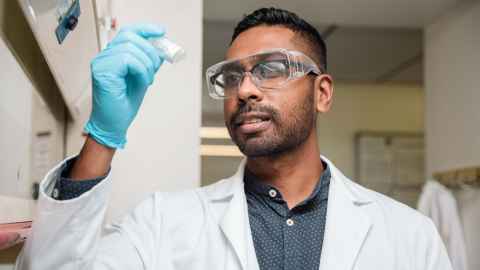Kapish Gobindlal
PhD candidate Kapish Gobindlal is researching ways to effectively destroy toxic chemicals at a molecular level.

Programme: Doctor of Philosophy in Chemistry
“I’ve always been concerned about the effect we as humans have on the environment, especially how we treat highly toxic waste.
“After completing my chemistry degree (BSc Honours) in 2013, I decided to work for a year in industry before starting my PhD. One year in industry quickly became six and I realised that there was a huge gap between the high-quality research output of institutions and the industrial implementation of those ideas.
“Pursuing a PhD has allowed me to progress the fundamental understanding of an emerging sector in chemistry, with the goal to directly inform treatment processes for toxic pollutants.
My area of research is centred around developing a novel and scalable technology, known as high-energy ball milling, to effectively destroy toxic chemicals at a molecular level.
“This method is seen as a green solution for persistent pollutants as no hazardous by-products are generated by the process and there is no requisite for noxious solvents or large energy input, thereby providing a sustainable alternative to current industry practices.
"This work has led to international research collaborations with industry and government agencies. It is envisaged that this research will directly inform real-world implementation for the treatment of obsolete chemical stockpiles and contaminated soil globally.
“This PhD will allow me to straddle the line between academia and industry, bridging the gap between high-quality research output and industrial application.
"During my PhD, I was given the opportunity to complete a Masters in commercialisation & Entrepreneurship (Distinction) from the Graduate School of Management at UoA. Combining these two degrees with my professional experience has helped develop a unique skillset to approach the often complex process of science and technology commercialisation."
We're always looking for stories to share from our passionate Science students.
If you have a story, we'd love to hear from you. Email science-web@auckland.ac.nz.